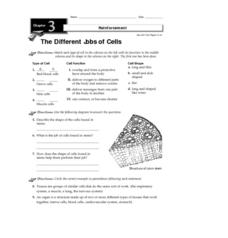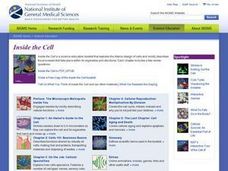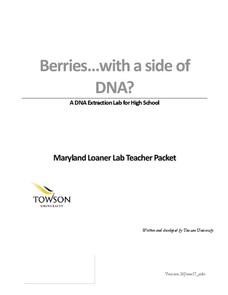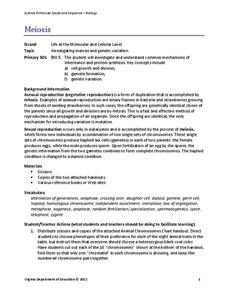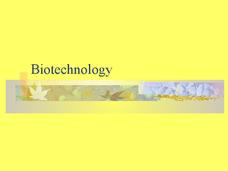Curated OER
Two-Cell Battery
Students build their own two-cell battery and determine which electrolyte solution is best suited for making a battery. They discuss background information for their experiment, construct and test their battery, and using the chart on...
Curated OER
GED Vocabulary: Life Science
In this life science vocabulary worksheet, students complete a crossword puzzle using 10 given clues about various topics of life science such as natural selection, cell structures and function and components of the body systems....
Teach Engineering
Organic Solar Energy and Berries
You can eat a solar cell? A unit on solar energy begins with a discussion about organic solar cells, followed by directions on how to build your own. After following the teacher's directions to build an anthocyanin dye-sensitized solar...
Curated OER
The Different Jobs of Cells
In this cells worksheet, students review different types of cells including their different functions and shapes. This worksheet has 6 matching and 3 short answer questions.
Teach Engineering
Photosynthesis—Life's Primary Energy Source
Wouldn't it be great if you could produce your own food? Scholars learn about the processes of photosynthesis and cellular respiration in plants. They consider how to use photosynthesis as a model of an efficient system and how to apply...
Baylor College
What Is a Neuron?
Your class won't get on your nerves while doing this modeling activity! After teaching the structure and function of a neuron using the included diagrams, give individuals some clay and chenille stems so that they can make their own...
Curated OER
Elements of Biology: The Cell
High schoolers study tissue engineering and its risks and benefits. In this biology lesson students take a stand on a side then research and support their position.
Curated OER
Inside the Cell
In this science worksheet, students study the structure and function of the cell by reading the information, studying the pictures and diagrams and finally completing a challenging crossword puzzle. There are 84 pages available.
Towson University
Berries...With a Side of DNA? (High School)
Is DNA still present after picking fruit or cooking vegetables? Biology scholars extract and collect DNA strands in an impactful lab. Working groups prepare their samples and compare their results to negative and positive standard...
Teach Engineering
Breathing Cells
Pairs work together to determine whether unknown solutions are either acids or bases by using a red cabbage indicator solution. After determining the general pH of the unknown solution, classmates blow into the same indicator after...
Curated OER
Looking Closer at Stems
In this looking closer at stems worksheet, learners fill in the blanks. Students use various resources to answer questions about stem morphology and anatomy.
Curated OER
Meiosis
Using yarn and chenille stems, lab groups collaborate to model mitosis and meiosis. Brief background information and a vaguely written procedure comprise this outline. More instruction needs to be provided to learners about cell division...
Curated OER
Reading Comprehension Worksheet: Cells
In this cell instructional activity, students read a short passage about simple cells or ground cells found in stems and leaves of plants. Students then answer four questions about the text.
K12 Reader
Tissues, Organs and Systems
Young scientists are introduced to the connections among cells, tissues, organs, and systems in a life science reading comprehension worksheet that asks them to respond to a series of questions based on the passage.
Curated OER
Cells, The Structural and Functional Units of Life
Students observe the general structure and organelles of plant and animal cells. Students prepare microscope slides of elodea, onion, check, and cork and identify the cells by size and shape as unicellular, multicellular, plant or animal.
Virginia Department of Education
Genetic Variation and Mutations
Young scientists demonstrate their creativity while completing several activities, to assess genetic variations and mutations. Instructors provide a list of options and scientists choose to write a comic strip, create a book, construct a...
Teach Engineering
Copycat Engineers
It's often said that imitation is the sincerest form of flattery. Young engineers learn about biomimicry, which uses nature to generate engineering ideas, in the fifth lesson of nine in a Life Science unit. Working in groups, they select...
Curated OER
The Nash Case -- Identifying, Choosing and Using Genes
Young scholars complete a variety of exercises as they examine the case of the Nash family who conceived one child in order to provide cells that may be used in a cell transplant for a dying sibling.
Curated OER
Parts of the Plant and Their Functions
Delving into this slideshow will help the students understand the composition of plants and their structures. Each slide identifies certain structures and explores how they support the plant's survival along with assisting our...
Curated OER
Biotechnology
A continuous cascade of information comes through this PowerPoint on biotechnology. The topic is defined, a history is presented, and basic genetic engineering techniques are explained. The topic is covered in an objective manner,...
Curated OER
Roots, Stems, and Leaves
In this plant worksheet, students review the structure and function of roots, stems, and leaves. This worksheet has 5 matching, 7 true or false, 4 multiple choice, and 10 fill in the blank questions.
Curated OER
Plant Cells and Tissues
In this plants instructional activity, students review 17 vocabulary words associated with the different types of plant cells and tissues. This instructional activity has 17 matching questions.
Nuffield Foundation
Observing Water Moving Through Plants
We know plants assist in the water cycle, but how do plants get water from the ground into the air? Through a series of demonstrations or labs, scholars observe the movement of water through plants. They microscopically view the cells...
Curated OER
Plant Structure and Growth
This plant structure and function PowerPoint addresses the main organs and the factors that affect its development as well as going into detail about the specializations at a cellular level. The cell functions and system adaptations...
Other popular searches
- Cell Biology Stem Cells
- Human Stem Cells
- Bioethics of Stem Cells
- Ethical Issues Stem Cells
- Stem Cells Genetics
- Embryonic Stem Cells
- Debates Stem Cells
- Benefits of Stem Cells
- Stem Cells Lesson Plans
- Animal Plant Cells Stem
- Stem Cells for Plannet
- Stem Cells for Plan Net





